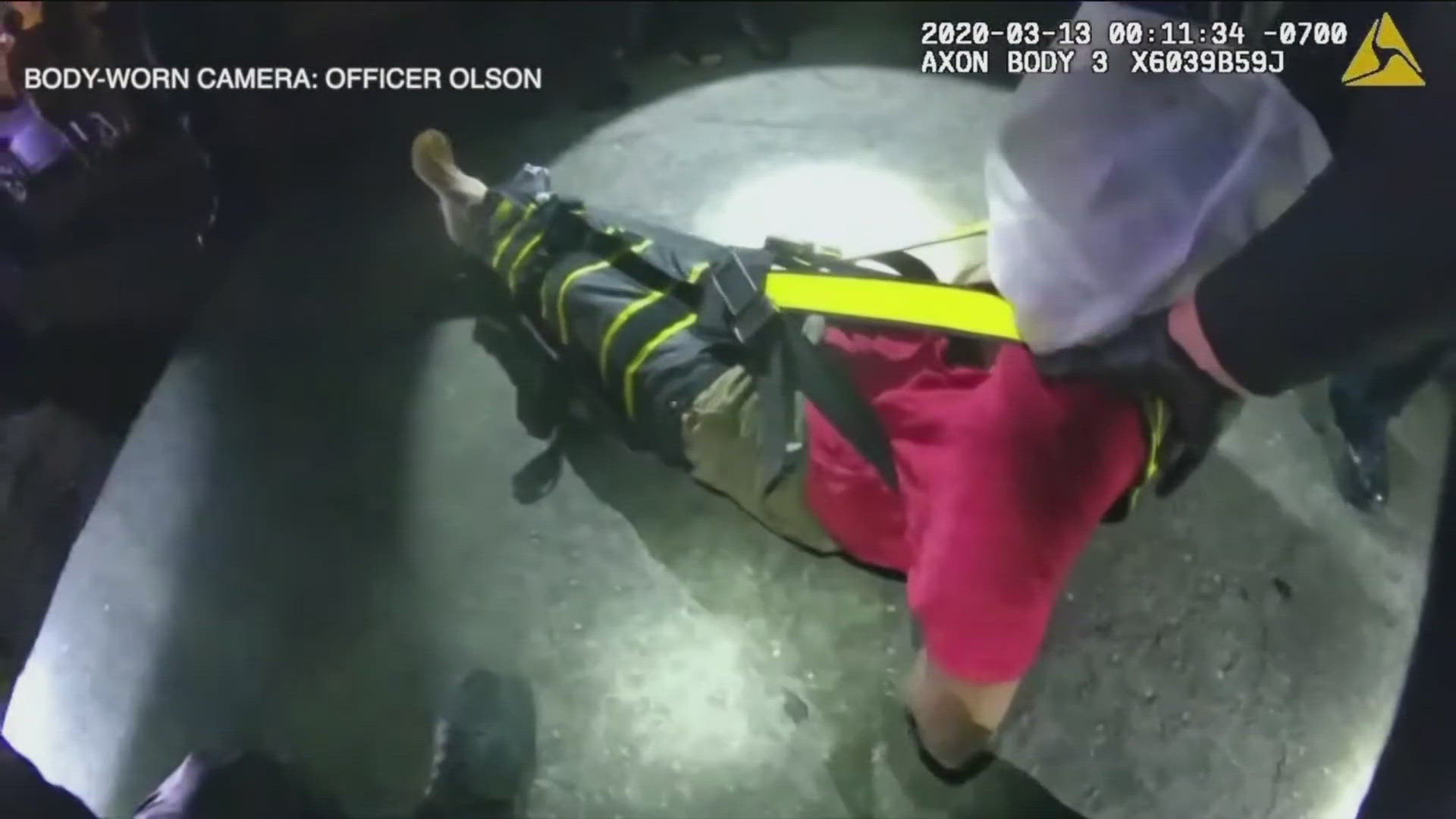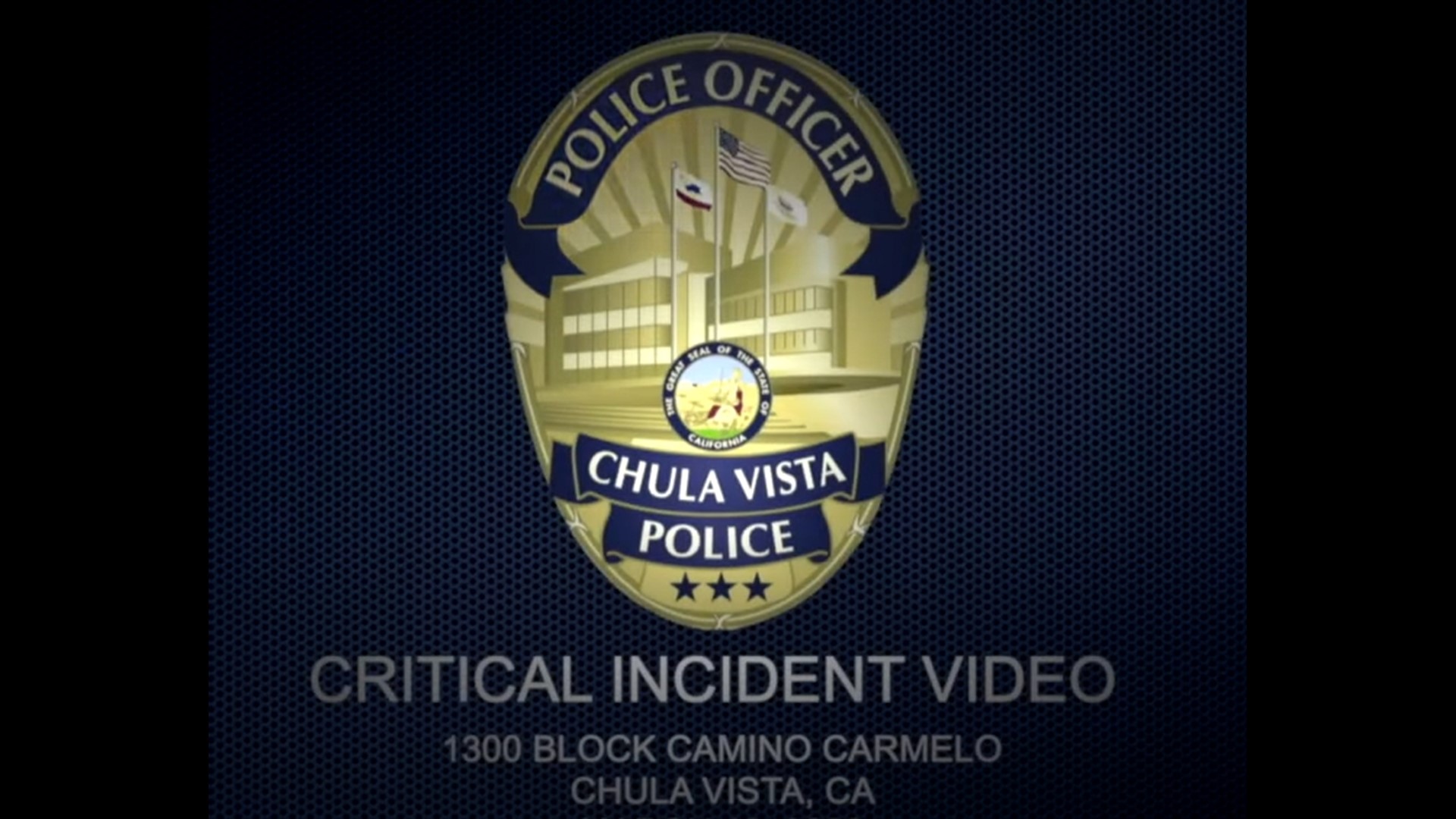A Daughter's Regret: Kimone Nunis Opens Up About Her Father's Tragic End
A state law bans law enforcement from using the medical term. Is it too little too late for families such as Kimone Nunis?

Kimone Nunis says calling 911 to get help for her dad was the worst thing she has ever done in her life.
Kimone Nunis's father, 56-year-old Oral Nunis, was in the midst of a messy divorce. He had been complaining of heart pain and went to the hospital where he was given anti-anxiety medication. Later that evening he grew paranoid and threatened to hurt himself.
Kimone Nunis called 911 just before midnight on March 13, 2020, for help calming him down.
Her final memory of her father was seeing him frightened amid a crowd of Chula Vista police officers. He was handcuffed, placed in a full body restraint, with a white mesh hood over his head.
The last thing Oral Nunis said coherently to his daughter as he was pinned down by police was, "OK, God bless you, Kim. I'm going to heaven."
Within 20 minutes of police arriving, Oral Nunis' heart had stopped beating. The man who committed no crime was dead by the time he reached the hospital.
“It's the worst decision I've ever made in my life,” she said. “That one call changed my whole life and I have to live with that every day because if I didn't call, he would be here with me taking care of his kids. It's not fair that I made that call and they chose to react the way that they did.”
Nearly four years after her father died, Kimone Nunis and her family have been left without answers about her father's death.
Instead, the only explanation that county law enforcement and medical officials have given Nunis and her family was that Oral Nunis died, in part, from an unfounded, and hotly contested medical diagnosis, called "excited delirium."
It is a diagnosis that has been used by law enforcement and medical examiners in the deaths of George Floyd, Elijah McClain, Daniel Prude, and thousands of others across the country.
It is a diagnosis that come January 2024 will be outlawed in California, leaving family members such as Kimone Nunis with far more questions than answers, chief among them what was the cause of death and what exactly is, excited delirium.
What is Excited Delirium?
Excited delirium is a medical term used by law enforcement, district attorneys and some medical professionals to describe people who exhibit sudden signs of aggressive and bizarre behavior, oftentimes exhibiting unexpected strength, paranoia, and violence toward others, all typically during police encounters.
According to documents from the District Attorney's office obtained by CBS 8, Nunis was one of at least 15 people to die from excited delirium while in police custody in San Diego County since 2015.
In recent years, medical professionals, as well as state lawmakers have poked holes into the medical theory.
The American Medical Association, the American Psychiatric Association, as well as other physician groups have denounced it. More recently, the National Association of Medical Examiners and the American College of Emergency Physicians have come out against the condition after years of support.
In addition, in January 2024, excited delirium will soon be outlawed in California and medical professionals, law enforcement, and municipal attorneys will be forbidden from using the term to explain the cause of death for those in police custody.
In 2023, State Assemblymember and Medical Doctor Akilah Weber co-authored a state bill that outlaws the use of the term.
In October Governor Gavin Newsom signed the bill into law.
Weber said the use of excited delirium keeps families from not knowing what their loved ones actually died from.
"When you use a term like excited delirium that has no medical foundation, no medical basis, it's not only a disservice to the health profession, the medical profession, but it's an extreme disservice to that person who has passed away and their family members as well," Weber said.
And while the law will go into effect in 2024 — it still won't undo the 911 call Kimone Nunis made the night that her father died.
'I'm going to heaven' The Death of Oral Nunis
Kimone Nunis and her husband had brought her father down from Bakersfield to stay in their home in March 2020. He wasn’t acting like himself in recent weeks, she said. He was paranoid, not eating, and believed people were watching him.
"I [would] just look in his eyes and they didn't seem like the person that I have known my whole life. So I would just try to calmly talk to him," Nunis said. "I would just like talk to him and rub his back and like, talk to him and then he would calm down."
She woke up the night of March 12 to him screaming. Nunis, a 13-year active veteran in the Navy who works in crisis situations, told 911 operators that her father was trying to jump from her second-story window.
Body camera footage of the police officer who arrived at the Nunis home shows the officer pulling out handcuffs as he approached Mr. Nunis. The body camera footage shows the officer approach Mr. Nunis with his handcuffs out. While sitting on the floor, inside his daughter's home, Mr. Nunis told the officer that he would go with him but he didn't want to be handcuffed.
The officer insisted it was department policy.
Kimone Nunis said the officer's tactics only worsened her father's agitation.
"He didn't say who he was. He never stopped and tried to defuse a situation or just introduce himself and say, 'Hey, I'm here, is everyone okay?' He just kept saying, 'It's policy,'" she said.
As seen in the video, Mr. Nunis attempted to stand up as the officer tried to handcuff him.
Suddenly, the officer's body camera shut off.
It resumed 34 seconds later.
During that gap, police say Mr. Nunis ran outside where the officer tackled him.
Warning: This video contains graphic and violent content. If you are sensitive to graphic material or find such content offensive, please refrain from watching.
Officers struggled with Mr. Nunis. Several officers placed their weight on him as they tried to pry a prescription pill bottle for anxiety from his hands.
Kimone Nunis tried to approach her dad in order to calm him down.
"I tried to go up and [the officers] started screaming at me," she said. "And they were screaming at my husband. And I was just trying to get to my dad. Eventually, I made my way to my dad and I just lay next to him. And I just talked to him because whenever I talk to him he would get calm. I just kept begging him to stop."
The footage shows Kimone Nunis squatting down next to her father, stroking his face to soothe him as she had during recent episodes.
"God bless you," Oral Nunis said to his daughter. "I'm going to heaven."
As several officers knelt on Mr. Nunis, other officers pulled Kimone Nunis away.
Officers then handcuffed him and placed a maximum restrain device on Mr. Nunis called the WRAP (Wrap, Restrict, and Protect). As Mr. Nunis grew more disorientated and he began to drool, an officer placed a spit sock over his head.
At 12:20 a.m., approximately 20 minutes after the first officer arrived at Kimone Nunis's home, Mr. Nunis was placed inside the ambulance to be taken to the hospital for mental health observation.
According to court depositions in a lawsuit brought by the family, paramedics removed the spit sock and noticed Mr. Nunis no longer had a pulse and was unresponsive.
With the WRAP and handcuffs preventing CPR on Mr. Nunis, paramedics rushed out of the ambulance to get an officer to uncuff Mr. Nunis and remove the WRAP. Once that was done, paramedics performed CPR on Mr. Nunis and continued to resuscitate him during the 28-minute ride to the hospital.
Mr. Nunis was pronounced dead when he arrived.
Hours later, law enforcement officers allowed Kimone Nunis to view her father's body through a hospital window.
"He was surrounded by people, but they wouldn't even let me go inside," remembered Ms. Nunis. "His shirt was ripped. They wouldn't let me say goodbye. I just kept begging but they told me that he was the property of the San Diego Police Department."
More Questions Than Answers
Kimone Nunis and her family waited for a year-and-a-half before discovering what Mr. Nunis died from.
The autopsy report did little to fill in the gaps for Mr. Nunis' family.
"Based on the information given, it is possible the decedent had some type of undiagnosed psychological disorder that altered his mental state enough to agitate him to the point of an excited delirium-type scenario where he would be susceptible to a sudden cardiac arrhythmia during the post-excitement phase of his heightened or altered sensorium," read the report prior to concluding, "the cause of death is sudden cardiorespiratory arrest while restrained in police custody, and the manner of death is undetermined."
Unsatisfied with the results, the Nunis family filed wrongful death lawsuits against the city of Chula Vista in September 2021.
In a February 2022 deposition, Deputy Medical Examiner Dr. Robert Stabeley elaborated on what he discovered during Mr. Nunis' autopsy and also on the County Medical Examiner Office's reliance on excited delirium.
During his testimony, Dr. Stabeley admitted that Mr. Nunis did not fit the usual case of excited delirium in several ways.
Mr. Nunis was not on drugs. He did not suffer from a serious mental illness.
"I said excited delirium-like because he does not fit the criteria for excited delirium," testified Stabely. "He did not have a fever. He did not have any cocaine or methamphetamine present."
Stabeley also testified to the veracity of excited delirium as a medical condition while criticizing detractors such as the American Medical Association.
"They are not forensic pathologists," he said. "They don't see these cases like we do."
As the Nunis family lawsuit moved forward, with a trial set in early 2024, it is unclear how the defense attorneys for the city of Chula Vista will move forward in regard to using excited delirium as a defense.
CBS 8 reached out to the city on numerous occasions for comment on the lawsuit as well as whether it is department policy to handcuff subjects during a mental health call. The city declined to comment.
CBS 8 also reached out to the San Diego County Medical Examiner's office and asked how the office plans to move forward now that excited delirium has been outlawed.
A spokesperson stated simply that it would comply with the new law.
As for Kimone Nunis and her family, they remain angry that a simple call to police for help took a loving father from her and her siblings forever.
"I'm mad at everybody," said Ms. Nunis. "I'm mad at the officers because human nature is to talk to people. And they never chose to do that. At no point was he threatening anyone. I'm mad at the system, if that really is their policy.
"It's wrong. It doesn't make any sense and it's not going to ever come out with a good outcome if that's how they're trained to react to situations."
She said her biggest goal with this lawsuit is that the officers receive proper training on how to de-escalate situations. People should be able to call 911 for help and not regret it the way she does.
"You're taught growing up that if you feel like you need help, it doesn't say for what reason, different reasons, if we need help, call 911. And I thought that's what I was doing. But now I feel like I can I can't do that. I just want education."
Trial is set for April 16, 2024.
WATCH RELATED: Excited Delirium - Medical condition or legal excuse for in-custody police deaths?



